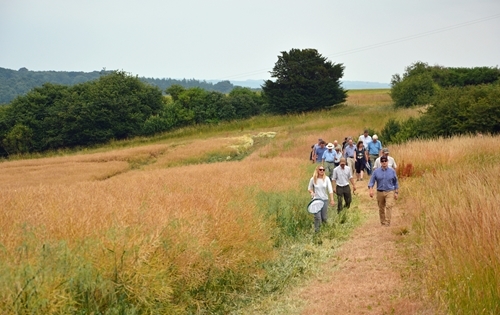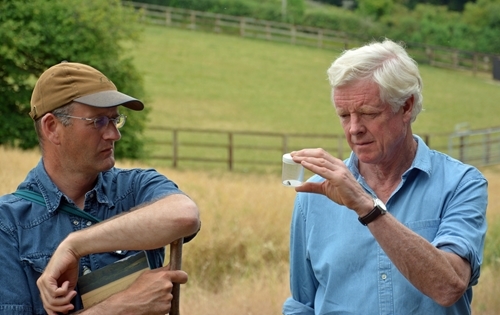
Bees’ Needs Week is an annual event coordinated by Defra and delivered in partnership with several charities, businesses, conservation groups and academic institutions to help raise awareness of bees and other pollinators. Events to celebrate insects are taking place across England from 9-15th July.
We’ve all got to do our part for this important campaign, and farmer clusters are no exception! Last week, GWCT and Buglife co-hosted a farm insect walk in a beautiful corner of Dorset within the Martin Down Farmer Supercluster. A diverse group of people attended including farmers, keepers, local villagers and cluster survey volunteers, as well as staff from Martin Down National Nature Reserve, the local AONB and Natural England.
Our route took in some arable field margins, where we found an abundance of butterflies and solitary bees of all shapes and sizes enjoying the purple thistle-heads. Bumblebees busily worked the white clover, tufted vetch and hedge woundwort. Hoverflies perched on bare-ground annuals such as scented mayweed and poppies, and honeybees worked the bramble blossoms in the hedge. Hang on - aren’t arable landscapes supposedly devoid of insects?! One only had to stop and look closely, to discover the tiny inhabitants all around. The oilseed rape in the field almost certainly enjoyed a yield boost from all these species working its flowers in May.
Laurie Jackson, farmland pollinator advisor at Buglife, explained the life cycle of one of the many types of solitary bee. They collect dry pollen with their hairy bodies, and return it to their own nest, often a little excavated hole in the soil or a natural cavity. They make such efficient pollinators because they are quite selective when visiting flowers, thereby ensuring the transfer of pollen fertilisation between flowers of the same species. Honeybees on the other hand have a very diverse palate, and make wet pollen using saliva, which is less likely to rub off – but the sheer number of workers in each hive arguably makes up for this!
Further along the grass margin, which is managed as part of a stewardship scheme, we were delighted to spot an uncommon dark green fritillary nectaring on creeping thistle. This bright orange, delicately marked butterfly is a powerful fast flier, and one of our farmer cluster target species.
Next we visited a piece of chalk downland SSSI, where bee orchids, chalk milkwort and wild thyme grew on short grazed turf. Stripy cinnabar moth caterpillars munched on ragwort, carder bees climbed into long pink tubes of foxgloves, tiny green and purple mirid bugs hopped amongst the grass, and soldier beetles lounged on bright yellow hawkbits. We checked out an unusual sandy scrape where we found a parasitic wasp up to no good, hoping to invade one of the solitary bees nests burrowed into the bank.
It was rewarding to see it dawn on people how much life is out there, and how reliant all of it is on our management. The take home messages were: firstly, every inhabitant of the countryside has a role and a requirement, even if we don’t yet understand it; and secondly, the more habitats and better conditions we provide, the more diverse and robust our insect populations will be.

Big thanks go to Laurie from Buglife, the landowners, and to Natural England’s Landscapes for Wild Pollinators initiative for funding.
To find tips on how to give bees and other insects a helping hand, check out the Buglife website, GWCT advice for helping bees, and the Farm Wildlife website.
2018 Farmer Cluster Conference
We are hosting our second annual Farmer Cluster Conference on Thursday 1 November 2018 at the Birmingham NEC.
We aim to build upon the success of last year's conference and this year's event will include talks from farmers, facilitators, Defra, Natural England, the GWCT and other organisations.
Sessions will include:
- Monitoring wildlife on a farmer cluster
- Ecosystem services through farmer clusters
- The motivation behind farmer-led conservation
- A first look at the new farmer cluster website
Tickets are only £45 (including lunch and refreshments). You'll have to be quick as tickets are very limited!
Book now >